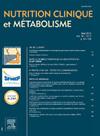Diet analysis of patients with inflammatory bowel disease in China
IF 0.5
4区 医学
Q4 ENDOCRINOLOGY & METABOLISM
引用次数: 0
Abstract
Inflammatory bowel disease (IBD) is a chronic condition characterized by periods of exacerbation and remission. During remission, managing lifestyle factors, including diet, becomes crucial for maintaining patients’ well-being. This study aimed to assess the home dietary habits of IBD patients and identify dietary patterns that could potentially worsen their condition, to offer individualized dietary recommendations for IBD management. A cross-sectional survey was conducted with 157 IBD patients who visited a tertiary hospital in Shanghai between January 2022 and April 2023. Participants were selected based on inclusion criteria, such as confirmed IBD diagnosis and willingness to participate. The Chinese Healthy Diet Index (CHDI) was employed to evaluate their home diet patterns. Additionally, purposeful sampling was used to select a set of participants for semi-structured interviews, which explored factors influencing dietary choices. These interviews focused on disease-related dietary knowledge, family and social environment, economic support, and health awareness, providing a comprehensive view of the factors affecting diet in IBD patients. The mean CHDI score for IBD patients was 56.27 ± 9.58, indicating sub-optimal adherence to dietary guidelines. Dietary intake rates for whole grains, mixed beans and tubers, vegetables, fruits, dairy, fish, and soy products were notably low, all under 20%. These findings suggest a need for targeted dietary education and support. The study highlights the importance of improving disease-specific dietary knowledge and access to social support to enhance dietary management and reduce the risk of IBD exacerbation.
中国炎症性肠病患者的饮食分析
炎症性肠病(IBD)是一种以发作和缓解期为特征的慢性疾病。在缓解期间,管理生活方式因素,包括饮食,对于维持患者的健康至关重要。本研究旨在评估IBD患者的家庭饮食习惯,并确定可能使其病情恶化的饮食模式,为IBD治疗提供个性化的饮食建议。对2022年1月至2023年4月期间在上海一家三级医院就诊的157名IBD患者进行了横断面调查。参与者是根据纳入标准选择的,如确诊的IBD诊断和参与意愿。采用中国健康饮食指数(CHDI)对其家庭饮食模式进行评价。此外,我们采用有目的的抽样方法,选择一组参与者进行半结构化访谈,探讨影响饮食选择的因素。这些访谈集中在与疾病相关的饮食知识、家庭和社会环境、经济支持和健康意识等方面,为IBD患者的饮食影响因素提供了一个全面的观点。IBD患者的平均CHDI评分为56.27±9.58,表明对饮食指南的依从性不理想。全谷物、杂豆和块茎、蔬菜、水果、乳制品、鱼类和豆制品的膳食摄入量明显较低,均低于20%。这些发现表明需要有针对性的饮食教育和支持。该研究强调了提高疾病特异性饮食知识和获得社会支持的重要性,以加强饮食管理并降低IBD恶化的风险。
本文章由计算机程序翻译,如有差异,请以英文原文为准。
求助全文
约1分钟内获得全文
求助全文
来源期刊

Nutrition Clinique et Metabolisme
医学-内分泌学与代谢
CiteScore
0.80
自引率
16.70%
发文量
216
审稿时长
78 days
期刊介绍:
Nutrition Clinique et Métabolisme is the journal of the French-speaking Society of Enteral and Parenteral Nutrition. Associating clinicians, biologists, pharmacists, and fundamentalists, the articles presented in the journal concern man and animals, and deal with organs and cells. The goal is a better understanding of the effects of artificial nutrition and human metabolism. Original articles, general reviews, update articles, technical notes and communications are published, as well as editorials and case reports.
 求助内容:
求助内容: 应助结果提醒方式:
应助结果提醒方式:


